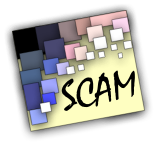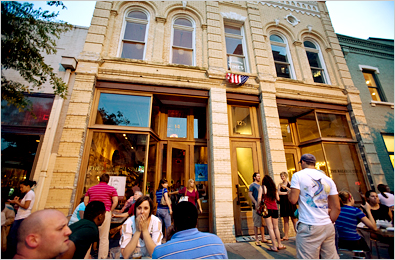

The aim of the International Working Conference on Source Code Analysis & Manipulation (SCAM) is to bring together researchers and practitioners working on theory, techniques and applications which concern analysis and/or manipulation of the source code of computer systems. While much attention in the wider software engineering community is properly directed towards other aspects of systems development and evolution, such as specification, design and requirements engineering, it is the source code that contains the only precise description of the behaviour of the system. The analysis and manipulation of source code thus remains a pressing concern.
Michele Lanza from University of Lugano, Switzerland will give the following keynote at SCAM'16:
Title:Dies Irae
Abstract:Researchers, Would you allow me, grateful as I am for the kind reception you once extended to me, to show my concern about maintaining your well-deserved prestige, and to point out that your star which -until now- has shone so brightly, risks being dimmed by the most shameful and indelible of stains?
Unscathed by vile slander, you have won the hearts of all. You are radiant in the intellectual glory of our community’s alliance with data science, you are about to witness the solemn triumph of our primary conference, the jewel that crowns a year of labour, truth, and freedom. But what filth this wretched “big data” affair has cast on your name - I wanted to say ‘reign’ -. A court martial, under orders, has just dared to acquit a certain type of research, a supreme insult to all truth and justice. And now the image of software engineering research is sullied by this filth, and history shall record that it was under our presidency that this crime was committed.
As they have dared, so shall I dare. Dare to tell the truth, as I have pledged to tell it, in full, since the normal channels of research have failed to do so. My duty is to speak out; I do not wish to be an accomplice in this travesty. My nights would otherwise be haunted by the spectre of the innocent researcher, far away, suffering the most horrible of tortures for a crime he did not commit.
And it is to you, researchers, that I shall proclaim this truth, with all the force born of the revulsion of a hopefully honest academic. Knowing your integrity, I am convinced that you do not know the truth. But to whom if not to you, the first magistrates of the ivory tower, shall I reveal the vile baseness of the real guilty parties?
Our people once were warriors. Source code warriors. They were people with mana, pride, and skills; people with spirit. If my spirit can survive living with this data science craze, then I can survive anything.
As of this year, SCAM has a strong partner conference: The International Conference on Agile Software Development (in short: XPConf). The conference partnership is supposed to foster a closer exchange of industry and academia, as XPConf is traditionally more industry-based, yet has a discussion-oriented format similar to SCAM. We plan to intensify the collaboration, but for now, you will see XPConf's logo on the website, and flyers and posters around the venue. To SCAM participants who are also interested in agile methods and software engineering in practice, XPConf features a research track, a PhD symposium, has special rates for academics, and reduced presenter fees. XPConf's unique possibility to do live experiments with a large number of seasoned engineers sets it apart from other conferences
Session Chair: David Lo
| Matthieu Jimenez, Mike Papadakis and Yves Le Traon. | Vulnerability Prediction Models: A case study on the Linux Kernel |
| Alessio Viticchie, Leonardo Regano, Marco Torchiano, Cataldo Basile, Mariano Ceccato, Paolo Tonella and Roberto Tiella. | Assessment of Source Code Obfuscation Techniques |
| Marco di Biase, Magiel Bruntink and Alberto Bacchelli. | A security perspective on code review: The case of Chromium |
Session Chair: Leon Moonen
| Xueliang Li and John P. Gallagher. | A Source-level Energy Optimization Framework for Mobile Applications |
| Maurício Aniche, Christoph Treude, Andy Zaidman, Arie van Deursen and Marco Gerosa. | SATT: Tailoring Code Metric Thresholds for Different Software Architectures |
| Andrea D'Souza, Di Yang and Cristina Lopes. | Collective Intelligence for Smarter API Recommendations in Python |
| Jiang Ming, Dinghao Wu. | BinCFP: Efficient Multi-threaded Binary Code Control Flow Profiling |
| Allan Blanchard, Nikolai Kosmatov, Matthieu Lemerre, Frederic Loulergue. | CONC2SEQ : A FRAMA-C Plugin for Verification of Parallel Compositions of C Programs |
| Tushar Sharma, Girish Suryanarayana. | Augur: Incorporating Hidden Dependencies and Variable Granularity in Change Impact Analysis |
| Benjamin Holland, Ganesh Ram Santhanam, Payas Awadhutkar, Suraj Kothari. | Statically-informed Dynamic Analysis Tools to Detect Algorithmic Complexity Vulnerabilities |
| Quentin Stiévenart, Maarten Vandercammen, Wolfgang De Meuter, Coen De Roover. | SCALA-AM: A Modular Static Analysis Framework |
| Jochen Quante. | A Generic Program Interpreter for Arbitrary Abstractions |
Session Chair: Árpád Beszédes
| Vincenzo Musco, Martin Monperrus and Philippe Preux. | Mutation-Based Graph Inference for Fault Localization |
| Adriano de Paula, Eduardo Guerra, Hitesh Sajnani, Cristina Lopes and Otavio Lemos. | An Exploratory Study of Interface Redundancy in Code Repositories |
| Chaiyong Ragkhitwetsagul, Jens Krinke and David Clark. | Similarity of Source Code in the Presence of Pervasive Modifications |
Session Chair: Mariano Ceccato
| Min Gao, Lei He, Rupak Majumdar and Zilong Wang. | llsplat: Improving Concolic Testing by Bounded Model Checking |
| Gergő Balogh, Tamás Gergely, Árpád Beszédes and Tibor Gyimóthy. | Are My Unit Tests in the Right Package? |
| Marinos Kintis, Mike Papadakis, Andreas Papadopoulos, Evangelos Valvis and Nicos Malevris. | Analysing and Comparing the Effectiveness of Mutation Testing Tools: A Manual Study |
Session Chair: Andrea Mocci
| Tukaram Muske and Alexander Serebrenik. | Survey of Approaches for Handling Static Analysis Alarms |
| Nelson Lossing, Pierre Guillou and Francois Irigoin. | Effects Dependence Graph: A Key Data Concept for C Source-to-Source Compilers |
| Gábor Antal, Dávid Havas, István Siket, Árpád Beszédes, Rudolf Ferenc and József Mihalicza. | Transforming C++11 Code to C++03 to Support Legacy Compilation Environments |
Session Chair: Alexander Serebrenik
| Dave Binkley and Dawn Lawrie. | A Case for Software Specific Natural Language Techniques |
| Stefan Fischer, Lukas Linsbauer, Roberto Erick Lopez-Herrejon and Alexander Egyed. | A Source Level Empirical Study of Features and Their Interactions in Variable Software |
| Leon Moonen, Stefano Di Alesio, Thomas Rolfsnes and Dave Binkley. | Exploring the Effects of History Length and Age on Mining Software Change Impact |
The 16th IEEE International Working Conference on Source Code Analysis and Manipulation (SCAM 2016) aims to bring together researchers and practitioners working on theory, techniques, and applications that concern analysis and/or manipulation of the source code of software systems. The term "source code" refers to any fully executable description of a software system, such as machine code, (very) high-level languages, and executable graphical representations of systems. The term "analysis" refers to any (semi-)automated procedure that yields insight into source code, while "manipulation" refers to any automated or semi-automated procedure that takes and returns source code. While much attention in the wider software engineering community is directed towards other aspects of systems development and evolution, such as specification, design, and requirements engineering, it is the source code that contains the only precise description of the behavior of a system. Hence, the analysis and manipulation of source code remains a pressing concern for which SCAM 2016 solicits high quality paper submissions.
We welcome submission of papers that describe original and significant work in the field of source code analysis and manipulation. Topics of interest include, but are not limited to:
SCAM explicitly solicits results from any theoretical or technological domain that can be applied to these and similar topics. Submitted papers should describe original, unpublished, and significant work and must not have been previously accepted for publication nor be concurrently submitted for review in another journal, book, conference, or workshop. Papers must not exceed 10 pages including all text, references, appendices and figures and must conform to the IEEE proceedings paper format guidelines and must be clearly marked as a research paper. Templates in Latex and Word are available on IEEE's website. All submissions must be in English.
The papers should be submitted electronically in PDF format via EasyChair at https://easychair.org/conferences/?conf=scam2016. submission will be reviewed by at least three members of the program committee, judging the paper on its novelty, quality, importance, evaluation, and scientific rigor. If the paper is accepted, at least one author must attend the conference and present the paper.
SCAM 2016 also features an engineering paper track for papers that report on the design and implementation of tools for source code analysis and manipulation.
In addition to the research track (see separate CFP), the 16th IEEE International Working Conference on Source Code Analysis and Manipulation (SCAM 2016) will also feature an Engineering Track. This track welcomes six-page papers that report on the design and implementation of tools for source code analysis and manipulation, as well as libraries, infrastructure, and the real world studies enabled by these advances. To be clear, this is not the addition of a new track to SCAM, which will remain a two track conference, but a significant expansion to the scope of the tools track of previous SCAMs.
What artefacts qualify as “engineering track” material?
A successful SCAM engineering track paper should:
Optionally (and encouraged):
Note that the submission length has a limit of six pages, compared to the two to four pages of traditional tool demo papers. This gives authors enough space to discuss artefact motivation, design, and use cases in much more detail. For example, a use case would be well illustrated by a demo scenario with screenshots. The papers should be submitted electronically via the conference web site.
Each submission will be reviewed by at least three members of the engineering track program committee. Authors of accepted papers will be required to present their artefacts at the conference. All accepted engineering track papers will be published in the conference proceedings. The key criterion for acceptance is that the paper should (a) follow the above mentioned guidelines and (b) make an original contribution that can benefit practitioners in the field now and/or others designing and building artefacts for source code analysis and manipulation. The artefacts can be in an early research prototype or a polished product ready for deployment. Papers about commercial products are allowed, as long as the guidelines described above are followed.
Videos and other demo material may be taken into account by reviewers as they review the paper. However, such material will not become part of the permanent record of the conference, so the paper should be self contained. In order to preserve the anonymity of the reviewers, such material should be hosted on an anonymous public source (e.g., youtube), or made available in such a way that the tools chair can download them once and redistribute them to reviewers.
All accepted papers will appear in the proceedings which will be published by the IEEE Computer Society Press.
Six pages IEEE format and can be submitted via EasyChair. Please use the IEEE templates in preparing your manuscripts:
Raleigh is a large, multicultural, and vibrant city, part of the technology center known as Research Triangle. It is the capital of the state of North Carolina, and located within a short flight of the major airline hubs on the U.S. East Coast. The city is known for its pleasant climate, tasty BBQ, and active music scene. Raleigh is crisscrossed by a network of public open spaces and recreational trails called the greenway, which provides for activities such as walking, jogging, hiking, and outdoor fun.
SCAM'16 will take place at the City Center Marriott on beautiful Fayettville Street, near many of Raleigh's happening restaurants.
Visit ICSME's venue page to reserve a room at the conference hotel, and for other relevant information.


Banquet
The banquet will be held Sunday night at 7pm @ the Boxcar Arcade, less than a 10 minute walk from the convention center. The Boxcar features over 70 original games (e.g., Tetris, Mortal Kombat, NBA Jam, etc.), pinball, air hockey, and shuffle board that attendees can play while socializing. The evening will feature an informal spread from The Pit, featuring BBQ AND excellent vegetarian options, and of course a selection from Boxcar’s rotating 24 craft drafts.
Post-Conference Bike Ride
On the Tuesday following the conference (Oct. 4th) there will be a group bike ride from the conference venue to the Trophy Brewery, an approximately 3.2 mile (5.15 km) trip in one direction. More info and signup on the ICSME social events page.